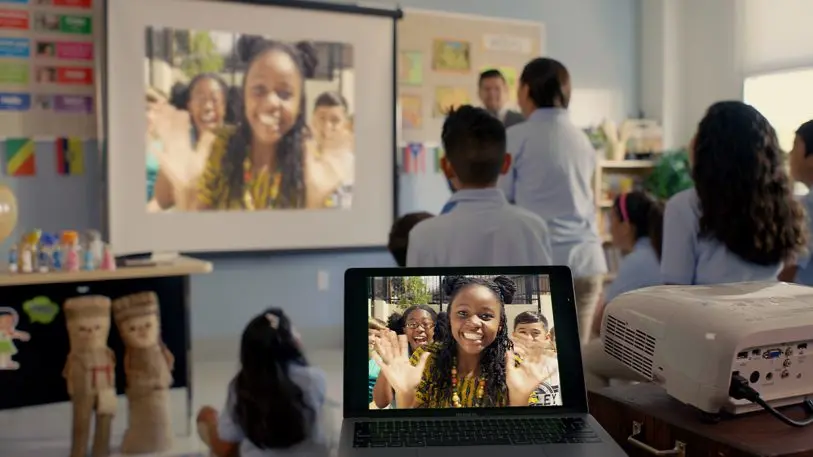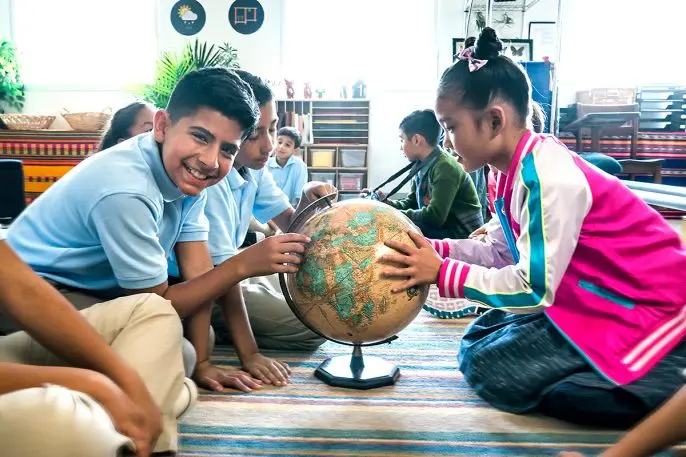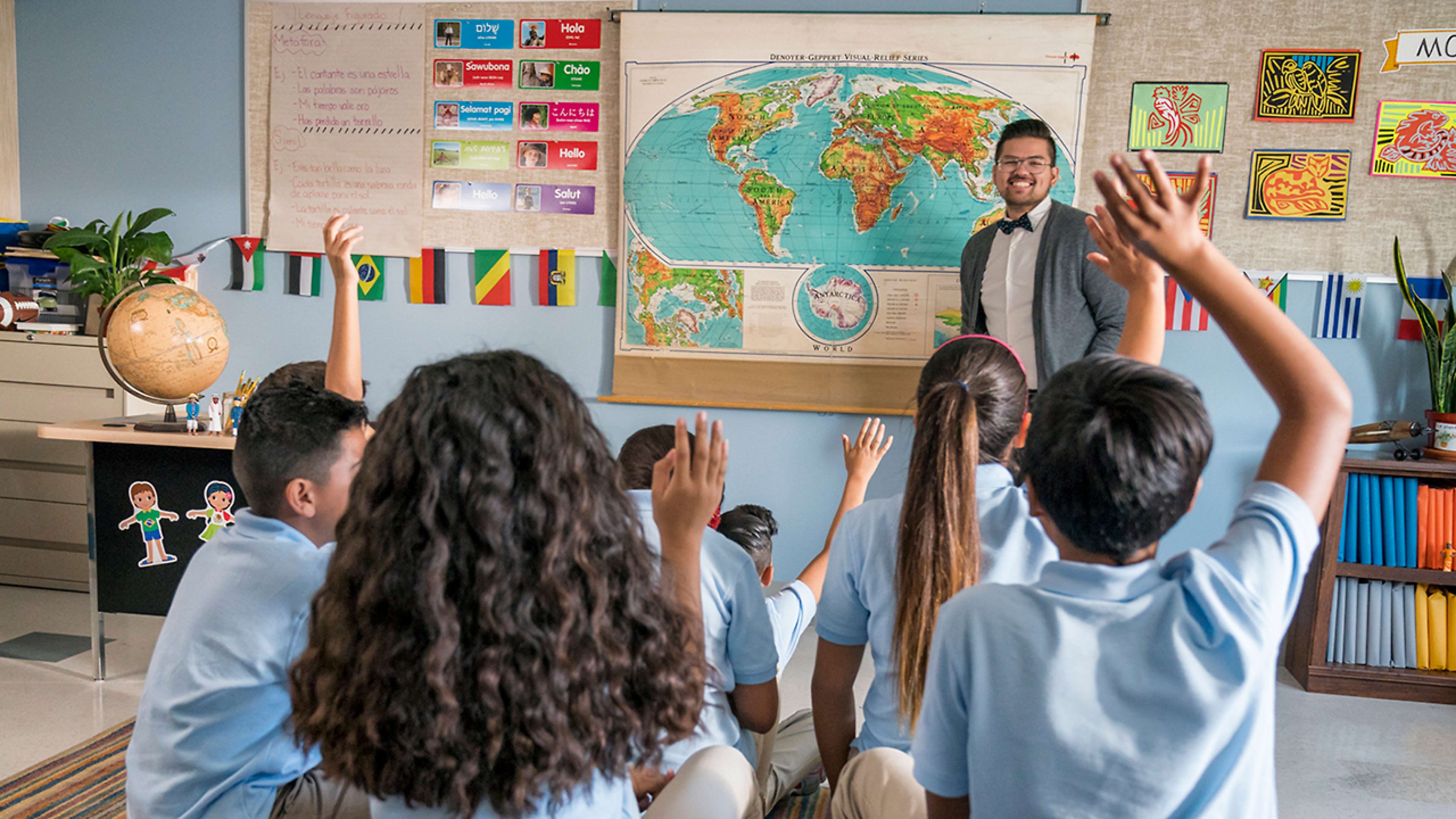Daniel Lubetzky, the founder of snack bar giant Kind, is a Mexican immigrant. His father was a Holocaust survivor. So when he started his business in 2004 with the name Kind, he envisioned it as a way to–besides sell food–encourage people around the world to be kinder to each other. As the company slogan puts it, Kind encourages loyalists to “do the kind thing for your body, your taste buds, and your world.” For a few years, the company’s foundation has pushed this mission even further, and now it’s pouring a lot of money into a specific project: a technology designed to get kids in schools exposed to different points of view.
“[Kind] does have a social mission, in that it’s not just about making money but also about making nutritionally rich snacks,” Lubetzky says. The idea is that if you feel good, you might be in a position to pay that feeling forward. But that’s a little nebulous. In recent years, Lubetzky has wanted to do more, especially because isolationism and bigotry appear to be on the rise.

“I’m frankly very alarmed by what’s happening within the United States and globally in terms of rising extremism, the inability of adults to listen to one another, increasing alienation and division,” he says. “You know, it’s kind of like the United States is no longer the United States of America, but it’s like two Americas, and in the rest of the world there’s a rise of white supremacism and neo-Nazis. For me it’s terrifying.”
Healthy snack bars can’t really challenge that directly, so Lubetzky has found a different way to tackle the subject. In 2015, he launched the Kind Foundation, a nonprofit backed by corporate revenue and Lubetzky’s own money that funds other types of socially good initiatives. “Our social mission, which centers around inspiring kindness, has been a core part of the company’s DNA since day one,” Kind Foundation director Dana Rosenberg says in an email. (That format is similar to PeaceWorks, another food-related company that Lubetzky launched in the mid-’90s to create business collaborations between polarized cultural groups like Israelis and Palestinians, which also has a foundation dedicated to unifying people in other ways.)
The foundation started with $3 million from Kind, and has received another $1.8 million from Lubetzky through a donor advised fund. So far, the group has started several programs to uproot institutionalized inequality, including Kind People, a 2016 campaign that awarded a total of $1.1 million to seven people trying to make change in their community, and Kind Causes, a grant program that gives out $10,000 each month to one social-impact group. In partnership with Harvard, it also runs a middle school and high school challenge for students to find ways to improve kindness; it’s also created a virtual experiment called “Pop Your Bubble,” a Facebook extension that pushes people to diversify their online friend circle.
On October 17, the Foundation announced its biggest bet yet, putting $20 million into Empatico, a video-conferencing and digital learning platform aimed at elementary schools that the foundation launched as a pilot earlier this year. Empatico creates interactive lesson plans that schools across America and abroad can do together, expanding everyone’s understanding of differing cultures and social norms. Part of the money will come from Lubetzky’s shares in the company.
“One of the most critical things we need to do in society is to develop critical thinking skills, emotional intelligence, and the ability for people to empathize with one another,” Lubetzky says. “The concept is to create a seamless, frictionless mechanism to allow classrooms across the world to connect with one another, kind of the way Airbnb or Uber help you find a ride or a place to stay, [we want] to very efficiently help teachers be able to frequently and easily connect [their classrooms] on a global basis to help narrow those gaps and help provide kids this amazing gift of being able to discover the world out of their own classrooms.”

The platform is free, as long as teachers have at least one laptop with a camera and can connect to the internet. Once that’s done, one class–usually of 8- or 9-year-olds–uses a scheduling tool to find another in a different region or county with availability to live chat during some group projects.
To help structure interactions, the organization has designed what it calls “Spark” activities or classroom lessons that last anywhere from one to three hours total and generally match the curriculum that kids are already learning. “Community Cartographers” is a two- to three-hour social studies course with about 30 minutes of video conferencing that encourages students to map the area around their school and use a satellite map to see how the school fits into the broader community and other landmarks in the area. Students in another place do the same thing. Then the two classes can log on, share, and discuss answers to expand their world view.
Other lessons discuss and explore the different ways that kids play, contribute to their community as a whole, and explore the weather and its affects in different places. There are also longer two- to three-week lesson plans.
Two schools piloted the platform earlier this year–one in Heber Springs, Arkansas, and another in Manhattan. The group has currently signed up 100 teachers across 13 countries–that includes Colombia, India, Azerbaijan, New Zealand, and Poland–and hopes to reach over 1 million students across at least 25 countries by 2020. The goal is to keep at least 25% of participants international. Empatico’s coursework is currently available only in English and it can only really network between other English-speaking schools, because of obvious language barriers. That’s something Lubetzky hopes to eventually fix over time, but is still working on the best translation hack.
To cover the cost of scaling up, the Kind Foundation says the internal project may eventually spin out as its own full-fledged nonprofit and attract more donations from other philanthropists. Lubetzky hasn’t figured out a way to make it self-sustainable yet because he wants to keep the service free for users.
“It needs to scale up like crazy so that we can provide counteracting measures to the increasing alienation and division that we’re seeing in the world,” he adds. “It’s just one small but very important step in that direction.”
Corrections: This article has been altered to reflect the following facts: Pop Your Bubble is for all Facebook users, not just kids; the Empatico pilot launched this year, not in 2015, and the foundation is not committed yet to spinning of Empatico into its own, full-fledged nonprofit.
Recognize your brand’s excellence by applying to this year’s Brands That Matter Awards before the early-rate deadline, May 3.
